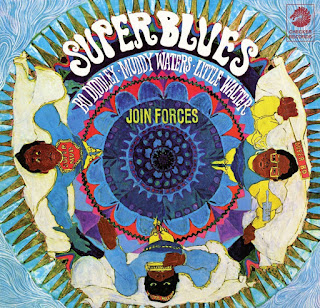Having a hard time figuring out a gift for the rock ‘n’ roller on your Christmas list? Don’t wanna buy ‘em just another crappy CD or a ragged vintage band tee? Well, consider the problem solved me droogs, ‘cause here comes Bo Diddley to the rescue!
Rock ‘n’ roll innovator Bo is back in the form of three gorgeous bobblehead figures. These special edition bobbles were produced by the National Bobblehead Hall of Fame and Museum in Milwaukee, Wisconsin with the help and support of the Bo Diddley Estate. Just look at ‘em! Three different classic Bo poses with the legendary guitarist wielding his trademark, self-designed rectangular “cigar box” guitar.
In case you’ve been living in a cave for the past few decades and are unfamiliar with ‘The Originator,’ Bo Diddley (a/k/a Ellas McDaniel) was the prototype rocker, an influential guitarist and songwriter with accolades as long as your arm. In 1987 he was inducted into both the Rock & Roll Hall of Fame and the Rockabilly Hall of Fame; he made his way into the Blues Hall of Fame in 2003. Diddley’s 1960s-era hits – classic tunes like the self-referential “Bo Diddley,” “Pretty Thing,” “Who Do You Love?,” “You Can’t Judge A Book By the Cover,” and “Diddy Wah Diddy” – influenced musicians on both sides of the ocean, from the Yardbirds and the Rolling Stones to Elvis Presley and Buddy Holly.
Diddley passed away in June 2008 at 79 years old after a lengthy illness. Over the course of his legendary career, Diddley released 33 studio and live albums, his last being 1996’s A Man Among Men, recorded with blues guitarist Jimmie Vaughan and Keith Richards and Ron Wood of the Rolling Stones. Bo also recorded with blues harmonica wizard Little Walter, Chicago blues legend Muddy Waters, and fellow rock ‘n’ roll pioneer Chuck Berry. He toured with bands like the Grateful Dead and the Clash and appeared in movies like Trading Places and Rockula. When Bo died, artists as diverse as George Thorogood, Eric Clapton, Robert Plant, Bonnie Raitt, B.B. King, Tom Petty, and Elvis Costello, among many others, lined up to sing his praises.
In a press release for the bobbleheads, National Bobblehead Hall of Fame and Museum co-founder and CEO Phil Sklar says “we’re excited to unveil the first bobbleheads of the legendary Bo Diddley as a tribute to the remarkable and groundbreaking musician. As one of the most influential performers of rock music’s early period, these bobbleheads are sure to be a must-have for music fans everywhere.”
Where can you get ‘em? The bobbleheads are individually numbered to 2,024 and are available exclusively through the National Bobblehead Hall of Fame & Museum online store [link]. The cost of each figure is right around the average for these sort of limited-edition collectibles: $30 for Bo standing, $35 for Bo Sitting, and $40 for Bo on the bike, or a cool $100 for all three. Shipping is a flat rate $8 per order.
Shipping won’t be until January 2025 but you can print out a picture of your bobblehead gift and give it to its recipient on December 25th and they’ll be anxiously watching the mailbox for the next month! You can bet that the Reverend will be adding one (or more) ‘Bo’s to my own growing bobblehead collection!

.jpg)





